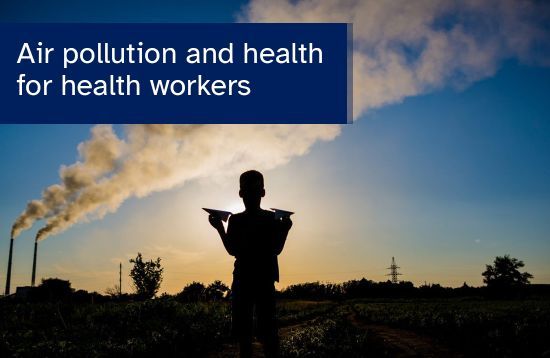
All health workers would benefit from gaining knowledge and skills to protect individuals and communities from air pollution exposure. This course examines the main health impacts of air pollution and which roles health workers can play to protect and promote people’s health.
Photo credit: Pond5 / UHDenis
Language: English
Health topic
Course information
Overview
Air pollution is a major environmental risk causing about 7 million premature deaths per year. These deaths are mostly caused from non-communicable diseases (NCDs) – such as ischemic heart disease, stroke, chronic obstructive pulmonary disease and lung cancer – but also from acute lower respiratory tract infections, such as pneumonia.
To date, air pollution – and more broadly environmental health – is not sufficiently addressed in the curricula of health professionals. Yet, the engagement of the health sector and the health community is pivotal to boost advocacy and political action for clean air. This requires a strong effort by governments and civil society willing to increase the awareness of current and future health workers to tackle the health effects of air pollution.
The target audience for this course is health workers which includes care-givers such as medical doctors, nurses, midwives, community health workers, and future health care professionals, as well as public health professionals and other representatives of the ministries of health.
This course is part of a broader set of material, the Air Pollution and Health Training Toolkit for health worker (APHT).
Course duration
Approximately 4 hours.
Certificate
An official Certificate of Achievement, issued by the World Health Organization (WHO), will be available to participants who score at least 80% in the final assessment.
Participants receiving a certificate of achievement can also download an Open Badge for this course. Click here to learn how.
Note
© World Health Organization 2023. All rights reserved. This online training was developed by the World Health Organization (WHO). It is intended to be used as a self-learning course. All reasonable precautions have been taken by WHO to verify the information contained in this training. However, the online training is being distributed without warranty of any kind, either expressed or implied. The responsibility for the interpretation and use of the online training lies with the reader. In no event shall WHO be liable for damages arising from its use. The designations employed and the presentation of the material in this publication do not imply the expression of any opinion whatsoever on the part of WHO concerning the legal status of any country, territory, city or area or of its authorities, or concerning the delimitation of its frontiers or boundaries. Dotted and dashed lines on maps represent approximate border lines for which there may not yet be full agreement. The mention of specific projects or entities does not imply that they are endorsed or recommended by the World Health Organization in preference to others of a similar nature that are not mentioned.
What you'll learn
- describe what are the main air pollutants and their sources;
- describe how humans are exposed to air pollutants;
- explain the main health effects of air pollution and which are the populations at higher risk;
- recognize the health benefit of both ambient and household air pollution interventions at the population and individual level;
- outline the leading role health workers can play to address air pollution and health issues with individuals, patients, and communities.
Course contents
Course introduction:
The course is introduced by a welcoming video from Dr Maria Neira, Director of the WHO Department of Environment, Climate Change and Health.Module 1: Outdoor (ambient) air pollution:
This module is a general introduction to ambient air pollution. It will consider the history of air pollution, its sources and health impacts as well as describe the classical air pollutants and their characteristics. The module will also discuss the main determinants of air pollution and health impacts, including climate change, and provide an overview on the WHO milestones on air quality and health, such as the global air quality guidelines.Module 2: Household air pollution:
This module will examine household air pollution and its main health effects, safety and social impacts. It will also discuss the impacts of household air pollution on the environment, climate change and poverty as well as discuss risk perception. It will provide a global snap on access to clean fuel and technologies at the household level.Module 3: Health effects of air pollution:
This module will explore the health effects of air pollution from the definition of adverse health effect to the main pathways of exposure and diseases. It will describe the main pathological mechanisms exerted by air pollution in harming the body and will differentiate short- and long-term effects. It will also highlight the populations at higher risks from the negative effects of air pollution exposure.Module 4: The role of health care workers:
This module will explore the role of health care workers in addressing the health impacts of air pollution, and provide concrete examples both at the clinical and public health level. It will provide the summary of main health messages regarding outdoor (ambient) and household air pollution, with some in-depth considerations on physical activity, the use of personal respirators and air filters as well as discuss behavioural change. It will address advocacy principles, actions and community engagement for clean air and present some available WHO tools, resources, communication material and campaigns.Assessment and evaluation
Acknowledgements
Bibliography
Enroll me for this course
Certificate Requirements
- Gain a Record of Achievement by earning at least 80% of the maximum number of points from all graded assignments.
- Gain an Open Badge by completing the course.